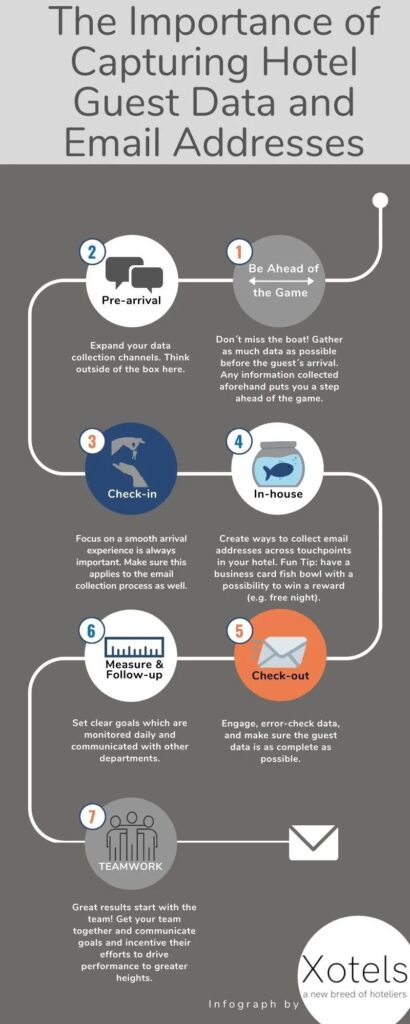
Step by Step Guide to Collecting Hotel Guest Email Addresses
Capturing hotel guest data and information including email addresses and other contact details has become a fundamental part of any successful hotel management strategy. Central to a winning strategy is an intelligent, modern email marketing approach. Even with the rise of social media and other digital communication channels, email remains the channel of reference for hotels to build a well-rounded distribution strategy, drive direct sales, issue special offers, and promote online reputation management.
Edit Post
WPBakery Page BuilderPreview(opens in a new tab)Add title
In fact, not only is email still the number one channel to engage guests, it maintains a steady increase of users year on year. And with the impact of the global pandemic on the hotel industry, it is set to become even more important a medium through which hoteliers can drive their businesses to continued success. After all, it is a crisis for the industry and hotels are exploring ways to attract guests again and increase revenues.
In this post:
- Why guest emails addresses are so important
- Always being one step ahead
- Step by step of the guest journey
- Follow-up
- Staff Training
- Transparency
- Dos and Don’ts
Why Guest Emails Address Are So Important to Hotels
Owning the Relationship
Social media companies and search engines are constantly updating their respective algorithms. Some important updates have seen traffic coming from specific websites drop sharply as a result. This is why it is of such crucial importance to build up and cultivate your email list and email strategy. With email, you don’t depend on a social media or search engine company. Your hotel keeps a record of its guest information with email and there is no risk of any algorithmic change suddenly changing your outreach ability.
Getting your Guest Information Right
Guest data provides insights into their profile type, purchasing behavior and unique preferences. Therefore, capturing the most relevant data is key. This enables your hotel to provide hyper-personalized service. For instance, understanding the specifics of why a certain booking of guests enjoy your hotel equips you to offer personalized offers in future to lure them back as repeat guests.
Getting your Email Strategy Wrong
There is an opportunity cost for capturing irrelevant data in place of relevant data, or of receiving data that is illegible or contains errors. Unusable guest data essentially makes offering a personalized service an exercise in guessing. For instance, it is a good idea to ask for two or more email addresses in case a guest’s primary email is input incorrectly or in case they don’t receive your hotel’s emails.
It is also critical that all staff, across all hotel client-facing roles, are fully briefed in the email marketing strategy that your hotel employs. Otherwise, there can be a discrepancy in trying to achieve the kind of customer experience that your email strategy portrays.
If your email strategy does not focus on the best ways to drive guest engagement, you risk missing out on the possibility of attracting future guests and boosting your online presence with positive feedback across the internet (social media, OTAs, search engines, and hotel and travel blogs). Moreover, the right approach can help you to cross-sell and upsell in order to drive revenues beyond the basic booking fee.
Always be one Step Ahead
The guest experience starts long before your clients arrive at your hotel. And, as they say, you only get one chance to make a good first impression. With this in mind, you can get hotel guest data before they arrive, via email. For instance, this allows you to help make the guests feel taken care of by asking for specific requests or preferences, or ways that you can help make their stay even better.
Harness your Direct Sales Strategy
Direct sales give you an unencumbered line to your guests, with no third party in between. Not only can you save on third party booking fees, but you also own the customer experience from the very beginning. This allows you to maintain a consistent experience for your guests and enable you to promote your hotel without any limitations.
It enables you to collect the specific guest information that you want. To maximize your success, email capture screens should be designed well, both for desktop and mobile. To improve hotel guest information capture further, you can also consider including a direct booking discount. Another option is to gather guest data at the time when the guest is about to leave the webpage. This might be for a direct sign-up, or perhaps it may be via your hotel’s blog.
Many guests aren’t clear on the advantages of direct bookings over going through an OTA. To make sure that there is no confusion, you can make the benefits very clear via your email campaigns.
Implement a Review Procedure
Your hotel can align social media, PMS, POS, and CRS to harness their full potential. A good approach is to perform a full operational review with your sales and marketing departments to identify opportunities for gains and where there might be communication issues between different systems.
Verify Everything at Check-in
Some guests come to your hotel via OTAs whereas others might be a direct booking in response to an email marketing campaign, as examples. With this in mind, it is important to verify the specific conditions of their booking, including a look at any specific details.
The Potential of Competitions and Promotions
You can promote the gathering of hotel guest email addresses with competitions and promotions. For instance, your hotel can find great success by offering a chance to win a free night’s stay, a discount, a meal, or another such prize, in return for signing up to your email list. There are so many ideas for promotions and competitions.
Step by Step of the Guest Journey
There are, of course, different steps on the customer journey during guests’ stay at your hotel. Each requires a specific approach.

Pre-check-in
Not every guest wants to share their personal information, especially during the pre-check-in step. Precise, clear instructions before check-in and explanations for each requested completed data field can help to boost your conversion rate.
At this stage it is a good rule of thumb to only ask for the essential information necessary to complete a booking. You can gather more hotel guest information at future touch points in the guest journey while at your hotel and after their stay.
For reservations with email on record, your hotel can send a welcome email letting the guest know what to expect and to provide helpful information, such as FAQs.
Check-in
At the check-in stage, email should be a mandatory field to be completed. Automated self-check-in desks require an email address to proceed. You can also incentivize email provision by highlighting the benefits of doing so, ideally as a package. These benefits may include one or more of the following:
- Welcome gift upon arrival
- Free wifi
- Late checkout included or at reduced cost
- Free drink or cocktail hour
- Access to concierge app or other services, including city guide information
During the guest’s stay
There are so many opportunities to gather your guests’ emails during their stay. It can be required to access certain facilities, including swimming pool, spa, and gym; for room service; and lounge area access.
It can also be mandatory to be eligible for discounts or upgrades. This whole process can be managed more easily with an integrated PMS system.
Additional on-site services can also be offered via email. For instance, your hotel can provide a service for guest requests with a front desk or concierge email address. These may include:
- Reservations for restaurants and other activities
- Guided day trips
- City information – in-house city guides or instructions for fun activities in the area by, for instance, creating a PDF document to send to guests’ email addresses, printing of guests’ tickets for flights and so forth. You can also restrict access to self-printing services in your business center by requiring email for its use.
Check-out
During the checkout process, a step that many hotels don’t attach the importance to it that it really deserves, you can create fun activities for guests to take part in. For instance, a business card fish bowl at the front desk. This allows you to ask your guests to leave their business card in return for the chance to win prizes, for instance, a free weekend break or dinner for two. You can also extend this to customers who haven’t stayed overnight – those who avail of your hotel for the restaurant, bar, or swimming pool perhaps.
Another way to gather hotel guest email addresses is to ask for feedback on their stay with the use of a tablet computer or other type of interface for a quick comment.
To make sure that your email strategy is as efficient as possible, email address and other contact information that is gathered must be recorded in your PMS/CRM on a daily basis.
Hotel Guest Data Follow-up
The follow-up is an important after-stay step and also crucial for repeat bookings. You can make sure that inconsistencies and errors in data capture are recorded by checking all hotel guest data following the ECR (email capture rate) metric. These can include wrongly spelt words or misunderstood numbers or other types of character.
A standards procedure should also be in practice in your hotel for when such problems occur. What is critical here is to avoid irritating guests by getting their data wrong.
Staff Training
The follow-up is an important after-stay step and also crucial for repeat bookings. You can make sure that inconsistencies and errors in data capture are recorded by cIf data is to be shared between hotel departments, training on interdepartmental communication and data management is needed. This can be recorded in your SOP. To really keep it up to your ideal standards, you can test it regularly with mystery guests and training among employees outside of peak hours.
Involve Staff in Driving Higher Results
Clear goal-setting, for instance, a 90% email capture rate, and strong communication from the top down will position your workforce to achieve outstanding email collection performance. This includes communicating the “why” – what a mere email address can really mean for the hotel’s success.
As your employees are very much “on the ground”, they are the individuals with daily guest contact better than anyone else in your workforce. Therefore, they can truly be a vital source of ideas when you decide on initiatives to launch. As a bonus, involving your employees in such a way can help improve team morale and employee satisfaction. To further improve guest data gathering results, you can incentivize your staff with prizes or even gamification techniques. For instance, the best performer wins a surprise gift each month.
These tactics can be measured with a daily performance report, excluding OTA-gathered emails. Of course, your hotel can also create weekly and monthly reports to measure progress and motivate employees. You may also wish to provide a daily or weekly reservation KPIs update to your staff. These can include wrongly spelt words or misunderstood numbers or other types of character.
A standards procedure should also be in practice in your hotel for when such problems occur. What is critical here is to avoid irritating guests by getting their data wrong.
Transparency
It is so important to be totally transparent with your guests. If you want specific data, it is best to let them know exactly why. Using customer data in any way that the guest doesn’t expect is a sure-fire way to generate negative feelings towards your hotel. It is an unnecessary risk but one that many hotels actually do take. It is best to be fully transparent at all guest touch points.
This will help engender a sense of trust in your guests, and enable you to cultivate a reputation for dependability.
Final Thoughts: the Dos and Don’ts of Successful Guest Data Collection
Successful hotel guest data gathering depends on implementing a series of best practices and avoiding others.
The Dos
To position your hotel on the road to outstanding email strategy success, do implement the following practices.
Know your “Why”
Understanding why to gather data is the foundation upon which you can build good results. It helps generate maximum client engagement, creates opportunities for repeat business and cross-selling (corporate to leisure and vice-versa).
Email enables your hotel to personalize the customer journey on a large scale from an early stage. Moreover, it grants you greater control over guest data management.
Digitize
The digitization of data means greater security and accuracy, as well as efficiency regarding updates and storage. It also increases the touch points where you can gather data in an accurate manner.
Deliver Real Value
Gone are the days of “one-size-fits-all” mass messaging. But customers don’t just want personalisation now – they want hyper-personalization, which means a unique customer journey based on their own preferences, profile, and transaction history.
This can guide your segmentation process and position your hotel to implement an email strategy that provides real value to your customers. As a result, it can generate more bookings and leverage upselling and cross-selling opportunities. After all, who doesn’t want to feel special? Hyper-personalization is the key to making your customers feel understood and appreciated like never before.
Don’ts
Avoid doing the following to maximize your success.
Cut Corners
This means no compromises when it comes to employee training, measurement processes and performance reviews with your team. It also extends to the type of technology that you use and the implementation of the steps required for a hyper-personalized email strategy and the sources for data collection. For instance, the most successful strategies look beyond conventional channels in order to increase hotel guest information capture.
If your hotel begins to cut corners with such steps, it is a slippery slope and can create a precedent for your entire strategy.
Failing to Consult your Team
Your client-facing staff speak to your guests more than anyone else in your hotel. Overlooking the unique feedback that they alone can offer is a misstep that unfortunately many hotels commit. This takes a degree of humility and self-awareness on the part of management. To ensure that it is in abundance, periodic management and delegation training is a good practice.
Not putting yourself in the customer’s position
Practice runs where you simulate being in the customer’s shoes when aiming to collect their data will clarify how effective the measures you take are. For instance, it might highlight where steps are strong or where elsewhere they may be a little overbearing and contribute to a negative customer experience.
Recap: How to Capture Hotel Guest Email Data Efficiently
A successful hotel and revenue management plan of action must include a strong email marketing strategy. It is critical for guest conversion, whether for first-time or repeat stays. It also creates the ideal platform for upselling and cross-selling opportunities, as well as the possibility for cross-over from business to leisure and vice-versa. In general, it enables you to gather higher quality hotel guest data, which can be used for so many commercial applications.

Patrick Landman is the CEO of Xotels, a game-changing hotel management company, since 2006. With its proven methodology in hospitality strategies and operations, it has built up a portfolio of over 75 properties, including boutique hotels, modern budget hotels and resorts. It turned around hotel performance by breaking with the status quo. If you need help with your hotel, they provide hotel management/owner representation services and revenue management consulting. Visit xotels.com for more information.





